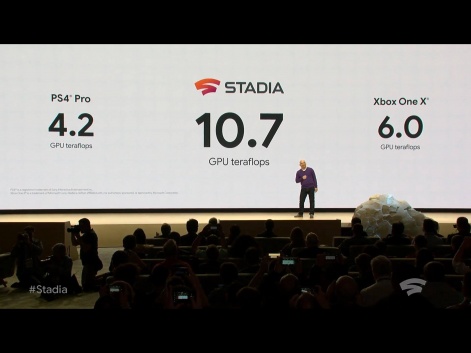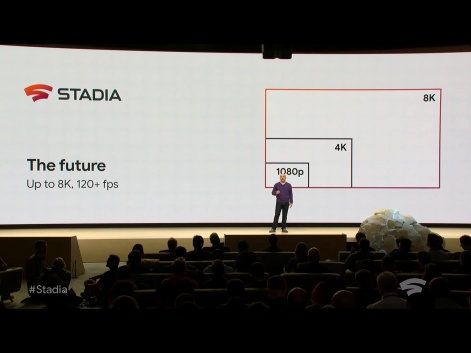To say that Google's entry into the games market was underwhelming is probably underselling it.
The search giant's Stadia streaming platform has limped out as what feels like a half-arsed effort, which is undeniably disappointing given the promise.
By all accounts, the tech is solid, which shouldn't come as a surprise for a company that has spent its entire existence trying to shape how the internet looks. But it's the games side of the business that appears to be lacking.
The warning signs were there from the start when Phil Harrison and co took to the stage at this year's GDC. We were promised the future of video games, with lots of vague claims about how the firm was going to revolutionise how people buy and play games, as well as interact with these experiences and content creators on its YouTube platform.
But ultimately, much of this was left at the headline stage. In March, Google more or less told us that they had data centres and therefore could beam content to your home at a fast pace at a really high resolution. That was more or less it.
The conventional wisdom for launching a platform is that you need to do a few core things. You need to show off what your tech can do, how much more sophisticated this is than your previous offerings or other platforms on the market and you need to show off things that can only be done with your solution. While first-party exclusives don't matter nearly as much as they did, say, in the PlayStation 2, Xbox and GameCube era, you need to be able to show the capabilities of your tech and having developers around who can make the most of it as something of a show of strength is important.

Google tried to demonstrate the first two points - it showed us how impressive its tech was and it showed us how much better it was than other solutions on the market. It seems to have succeeded to a degree, which in itself is pretty impressive when you consider how many companies have tried and failed to do games streaming.
But it's the content side of things that has really let the Big G down. The head of Google's Stadia Home and Entertainment arm - its first-party studios - Jade Raymond made an appearance at the GDC Stadia reveal event, but she only officially joined the company and unofficially can only have been at Google a few months.
It was only in October, weeks before Stadia was set to launch, that Google and Raymond announced its first studio, which would be in Canada's Montréal. When we dug into who was working on Stadia earlier this year, it turned out that its production and development staff were all fairly recent additions, meaning is likely going to be years before we see any first-party content coming out from Stadia Games and Entertainment - something Raymond came out and said in October.
So when the platform did roll out on November 19th, just one of the 12 launch titles was an exclusive - Gylt from Rime make Tequila Works. Well, sorry, one of the 22 launch titles after Google added another ten games at the last minute. I'm not going to knock Tequila Works because none of this is the studio's fault, but Gylt isn't exactly the sort of game that is going to make people stop playing on PC and console en masse to try Stadia out.
While Google has been building up the tech side that's formed Stadia's business for years, but it's the content side that's letting the side down
And while we're on the subject of Stadia's launch slate, the fact that Google quickly added ten games the line-up just days before the platform rolled out isn't exactly an indication of a company that has a really solid plan, but maybe that's just me.
It's not just on the actual games content side of things that Stadia has been somewhat lacklustre, either. Before its release, product director Andrey Doronichev and product manager Beri Lee took to the Stadia subreddit to do an AMA event with questions from the community in which it revealed that... much of the functionality that had been announced before launch would not be available. We already knew that the Stadia controller could not be used wirelessly with phones and computers, which is, in itself, bizarre. Other features missing included Stream Connect, State Share and Crowd Play. Family Sharing and Buddy Passes were not available. Oh, and achievements were going to be logged but users wouldn't be told about them until the feature rolled out at some point after launch.
As if that wasn't enough, Chromecast Ultra hardware that was already in the wild wouldn't work with Stadia before an update was rolled out; only Ultras that were shipped with Stadia pre-orders would work. Only now - one month after the platform was launched - is Stadia usable on regular Chromecast Ultras.
Speaking of, pre-orders for Stadia were an absolute mess, too, with users who had put their cash upfront told they wouldn't be receiving the goods they had paid for until after launch. Oh, and some of the Chromecast Ultras that had been shipped out were overheating and shutting down, something that Google responded to by saying that... overheating was normal but that it hadn't encountered devices shutting down during its testing.
Add up all of the above and it's hard not to view Stadia's launch as hugely rushed. It's likely that Google was trying to get its platform out of the gate in time for Christmas and it definitely will have wanted to ship before the new Xbox and PlayStation hardware is properly announced and launches next year.
The company knows that the games conversation in 2020 is going to be absolutely dominated by PlayStation 5 and Microsoft's new Xbox so it would be hard to muscle in enough space to get its message out to the games audience. Launching ahead of the other platforms in itself is pretty smart, but the execution leaves a lot to be desired. As shown by Nintendo's Wii U, rolling out before your rivals only really works when you have something that the audience wants and is an actual step towards the next generation.
Rumours of Google entering the games space with its own platform have been swirling for years now and the staff handling the tech and infrastructure side of things at the search giant have been working on it for a long time; it just seems that Google didn't consider the fact that content was equally important.
And it didn't want to have anything ruining its hype either; the search giant did precious little coverage with press and influencers, instead choosing to do Nintendo Direct-style presentations periodically to announce new games and, well, tell us how Stadia all worked.

The thing to remember with Stadia is that it isn't really for the typical gamer. It's not for the people who already own a console or PC; streaming is meant to be the thing that expands the audience for interactive entertainment beyond folks willing to splash at least $400 on a bit of hardware to do so.
Much in the same way that the audience for video games expanded in a huge way with the proliferation of mobile phones, the ability to stream games to any device, in theory, will make this content accessible to a bigger audience than ever before.
With a low monthly cost, too, audiences that haven't been able to access console and PC games due to the huge cost of entry will be able to give them a go, especially ones with a high level of infiltration of mobile phones. Emerging markets such as India have a growing middle class with disposable income and top-tier fibre internet infrastructure. Right now, there are data caps in the country but a few years down the line it's entirely possible that we'll have a massive market with cash to splash, crying out for games content.
What remains to be seen is whether Google is going to stick with its video games bet. The search giant is infamous for launching and closing projects, with products having an average lifespan of just four years. If Stadia Games and Entertainment has only recently set up its first studio, then with the amount of time it takes to make a game in the current landscape, it's entirely possible that an own-developed project might never actually make it out of the door.
















